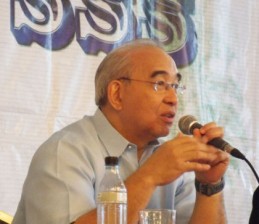Palace OKs hike in SSS member contributions
MANILA, Philippines—Malacañang has approved a 0.6-percentage-point increase in member contributions to the Social Security System (SSS) to be paid for by employers and their workers.
SSS president Emilio de Quiros Jr. made the announcement Tuesday, saying the increase will be collected beginning January.
Employees’ contributions to the SSS will thus rise from 10.4 percent to 11 percent of a member’s monthly salary credit.
The bigger share of 70 percent of the monthly contribution will continue to be shouldered by the employer, while 30 percent will continue to be paid for by the SSS member.
De Quiros said the hike in contributions comes with an increase in the ceiling for the monthly salary credit from P15,000 to P16,000.
Article continues after this advertisementThe monthly salary credit is the base for computing the 10.4 percent (which will be 11 percent) contribution.
Article continues after this advertisementCurrently, the minimum monthly salary credit is P1,000 and the maximum is P15,000.
An individual with a monthly salary ranging from P1,000 to P1,249.99 falls under the monthly salary credit of P1,000. This means the monthly SSS contribution should be 10.4 percent of P1,000, or P104.
Welcome development
An individual with a monthly salary of P14,750 or more falls under the monthly salary credit of P15,000. This means the monthly contribution to the SSS is 10.4 percent of P15,000, or P1,560.
Come January, De Quiros said, the maximum salary credit will be P16,000. This means the highest base for computing the 11-percent contribution will be P16,000 instead of the current P15,000.
The SSS president said the President’s approval of the increase was a welcome development because of the need to lengthen the life of the SSS.
With its fund at current levels, he said, estimates are that the SSS would be able to continue servicing claims only until 2039, or for the next 26 years.
But with the 0.6-percentage-point increase in contributions, De Quiros said, the SSS may continue to operate three more years after that or until 2042.
“The increase in contributions is part of the SSS reform agenda, which is aimed at strengthening the institution and stretching the life of its fund to perpetuity,” he said in a forum yesterday.
International standards mandate that the life of a pension fund should be at least 70 years to be technically considered “perpetual.” The SSS has been in existence for 56 years.
De Quiros said the reform agenda was a continuing process and the SSS would be pushing for succeeding increases in contributions after the latest one is implemented next year. This is to achieve perpetuity of the fund, he said.
In particular, he said, the SSS would likely push for a hike in contributions every two years.
“We hope to get this [continuing increase in contributions] going in order to reach the target [life span] for the SSS,” De Quiros said.
Meantime, De Quiros said, the SSS intends to also raise pension benefits.
He said the SSS was looking at a 5-percent hike in monthly benefits of SSS pensioners to be implemented also in 2014.
“We also intend to increase the benefits,” De Quiros said.
President Aquino in his State of the Nation Address in July said a reform agenda for the pension system was one of his administration’s priorities. He said a rise in SSS contributions was necessary since from the 1980s, contributions were raised only twice while pension benefits rose 21 times.
The hike in contributions will be implemented despite reservations by the business community.
